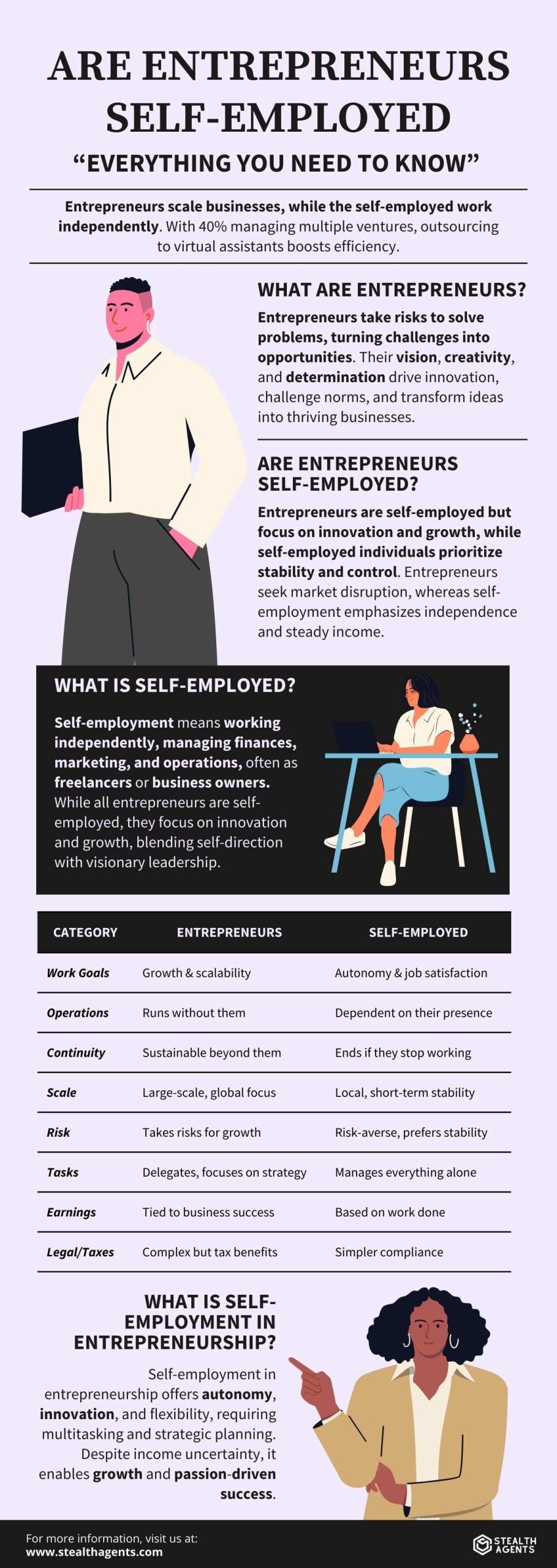Entrepreneurs vs. Self-Employed — understanding the difference is key to building a scalable business. While entrepreneurs focus on growth and delegation, many self-employed individuals stay stuck doing everything alone. Stealth Agents helps entrepreneurs scale faster by providing skilled virtual assistants to handle repetitive tasks, so they can focus on strategy and expansion.
👉 Start scaling smarter with Stealth Agents: https://stealthagents.com/are-entrepreneurs-self-employed/
Are entrepreneurs self-employed, or do they inhabit a realm of their own?
Nearly 70% of new startups are founded by individuals who identify as self-entrepreneurs and self-employed entrepreneurs, illustrating the blurred lines between these roles.
Understanding the dynamics of entrepreneur vs self-employed becomes crucial for navigating today’s business landscape as the entrepreneurial spirit thrives.
Recent data shows that over 40% of entrepreneurs also manage multiple ventures, emphasizing the need for strategic delegation and support through virtual assistant services. The self-employed vs. entrepreneur debate often leads to the necessity of outsourcing tasks.
Stealth Agents offers unparalleled expertise, free consultations on client preferences, and virtual assistant pricing, empowering you to focus on what truly matters.
What Are Entrepreneurs
The risks that entrepreneurs take are driven by the ambition to solve societal issues or fulfill unmet needs.
Successful entrepreneurs from poor to rich illustrate the power of determination and innovation in transforming challenges into opportunities.
With a firm resolve and vision, they courageously navigate uncertainties, creating innovative solutions and sustainable businesses that contribute positively to the community.
Trailblazers are fearless innovators who courageously step away from conventional routes to carve unique paths. Their boldness and creativity drive them to challenge norms and establish groundbreaking methods. Through their determination, they achieve success and inspire others to pursue uncharted territories.
Entrepreneurs navigate the business world with creativity, determination, and a strong vision, tackling challenges and embracing uncertainties. This is exactly what Entrepreneurship for self-employed is.
Inventors, innovators, and leaders possess the unique ability to transform simple ideas scribbled on a napkin into thriving businesses. Their creativity, vision, and leadership skills drive innovation, enabling them to nurture growth and achieve remarkable success in the business world.
Are Entrepreneurs Self-employed?
Entrepreneurs are technically self-employed, yet the question often arises: are entrepreneurs self-employed in the same way as all self-employed individuals? This distinction becomes more apparent when examining the “entrepreneur vs self-employed” dynamics regarding approach and objectives.
Entrepreneurs, or self entrepreneurs, focus on innovation, business scaling, and capitalizing on high-reward, albeit high-risk, opportunities, which challenges the traditional notion of “are entrepreneurs self-employed” in the conventional sense. They aim to create businesses with significant growth and expansion potential, often seeking to disrupt markets and introduce new solutions.
In contrast, a self-employed entrepreneur or self entrepreneurship typically owns and manages small businesses, prioritizing stability and maintaining direct control over operations. This “self-employed vs limited company” perspective highlights that their primary goal is not to conquer markets but to maintain independence and personally manage their tasks and responsibilities.
While all entrepreneurs fall under the self-employed category due to their independent ventures, “Are entrepreneurs self-employed?” underscores that the converse is not always true. A vision marks the entrepreneurial path for broader impact, whereas self-employment may focus more on sustaining a reliable income and personal autonomy.
What is Self-Employed?
Self-employment represents a state where individuals choose to work for themselves rather than under the structure of an employer, leading many to question: are entrepreneurs self-employed by default? This path is marked by distinct traits, including independence, entrepreneurship, flexibility, self-motivation, adaptability, financial responsibility, and networking skills, all contributing significantly to their success as self-entrepreneurs.
Typically, self-employed individuals are independent contractors, freelancers, sole proprietors, or small business owners, often called self-employed entrepreneurs. Each is responsible for generating income and managing their business operations independently. With control over their work schedules, client relationships, and business decisions, self-employed individuals enjoy autonomy that allows them to tailor their professional lives to their personal goals.
Are entrepreneurs self-employed in the true sense, or do they embody a broader definition of self-direction as explored in the entrepreneur vs self-employed debate? They often work across various industries or professions, leveraging their skills to create unique opportunities for growth and development and navigating the self-employed vs entrepreneur spectrum.
Essential tasks for these individuals include marketing their services, managing finances efficiently, and ensuring adherence to relevant regulations, all of which require a diverse skill set.
The self-employment journey is undoubtedly challenging. It demands initiative, self-reliance, and a robust work ethic to thrive amidst fluctuating market dynamics.
Ultimately, are entrepreneurs self-employed, or do they represent a hybrid of self-employment and visionary leadership, offering unparalleled personal and professional fulfillment contingent on one’s ability to navigate its inherent challenges with resilience and passion?
Entrepreneurs Vs Self-Employed
1. Work Objectives
A self-entrepreneur often prioritizes personal autonomy, relishing the freedom to steer their ship without traditional workplace constraints. As self-employed entrepreneurs, they focus on job satisfaction, aligning their work with individual values and interests to ensure daily activities are rewarding.
A balanced work-life dynamic is essential to integrating professional duties with personal life for enhanced well-being. Providing high-quality services is central to their approach, as the stability of their income depends on solid client relationships.
Entrepreneurs focus on growth and innovation in the entrepreneur vs self-employed debate, constantly pushing their businesses toward new horizons. They aim to scale operations, transforming small ventures into substantial enterprises capable of market disruption.
This self-employed vs entrepreneur distinction highlights the entrepreneur’s drive to develop market-leading products and services, ultimately achieving significant financial success and creating lasting value.
2. Business Operation
The mode of business operations varies significantly between entrepreneurial ventures and self-employment. Entrepreneurs architect businesses that can operate with or without their constant presence. They construct systems, processes, and teams that drive the company towards its goals, even in their absence.
Often, entrepreneurs are more focused on the strategic direction and growth of the company rather than the daily tasks.
They leverage their time and resources to build a sustainable enterprise that can run efficiently on auto-pilot under competent management.
On the other hand, self-employed individuals are integral to their business operations. Their businesses heavily rely on their personal expertise, skills, and presence. A self-employed person is often responsible for a broader range of tasks, from strategic planning to daily operations.
And their business may struggle to function without them. This structure often limits the scale of self-employed ventures.
Entrepreneurs also typically aim for scalable, innovative products with high growth potential, often willing to take significant risks and seek long-term expansion. In contrast, self-employed individuals usually offer specialized, niche products or services, prioritizing expertise and customization while maintaining autonomy and managing risk conservatively.
3. Business Continuity
In the context of self-employment, the business is generally closely intertwined with the owner. Their entrepreneurial skills and personal involvement keep the operation running. Therefore, if they retire or unfortunately pass away, the business often ceases to exist.
On the other hand, entrepreneurs build their businesses with long-term continuity in mind.
They develop a competent team that fully grasps the business’s mission and vision, ensuring sustainability beyond the self-entrepreneur’s presence. This highlights the difference between entrepreneur vs self-employed, underlining how self-employed entrepreneurs can build lasting enterprises and contrasting self-employed vs entrepreneur dynamics.
Even after the entrepreneur steps away, retires, or passes away, the company can continue to operate.
Continuity in the business world provides stability, fostering a lasting legacy and sustainable business practices for long-term growth. For the self-entrepreneur or self-employed entrepreneur, understanding the nuances of entrepreneur vs self-employed and self-employed vs entrepreneur is crucial for achieving long-term success and resilience.
4. Scale and Strategy
Entrepreneurs adopt a global mindset, strategizing for expansive, long-term business goals. They envision their business on a large scale and plan for growth and expansion, focusing on reaching broader audiences and markets.
Entrepreneurs typically own larger-scale assets like factories and intellectual property crucial for growth and expansion.
They often rely on innovative solutions, leveraging technological advances and industry trends to elevate their business. Conversely, self-employed individuals typically focus on smaller, short-term goals. Their primary concern is often how to meet immediate needs and maintain a steady workflow.
Their scale is usually local or regional, with strategies centered around sustaining their business rather than expanding it.
Self-employed entrepreneurs and self-entrepreneurs often own smaller-scale assets tailored to their unique services, like specialized tools or equipment. The distinction between entrepreneur vs self-employed and self-employed vs entrepreneur lies in their approach to asset management and business scalability strategies.
They value stability and consistency, prioritizing the fulfillment of current contracts and nurturing relationships with existing clients.
5. Risk Management
Both self-employed individuals and entrepreneurs face risks, but self-employed individuals, for instance, tend to be more risk-averse. They typically prefer a stable income, predictable work hours, and a controlled business environment.
Their business risk management strategies often avoid taking significant risks to prevent jeopardizing their steady income stream.
Entrepreneurs and self-employed individuals alike embrace risks as integral to their business strategy. Whether an entrepreneur is self-employed or not, understanding the dynamics of entrepreneur vs. self-employed and self-employed vs. entrepreneur is crucial for taking calculated risks that drive innovation and substantial growth.
Entrepreneurs often see risks as opportunities, not just potential threats.
Entrepreneurs, whether self-employed or self-employed, embrace risks as integral to their business strategy. Understanding the entrepreneur vs self-employed and self-employed vs entrepreneur dynamic, they realize that taking calculated risks is crucial for pursuing innovative ideas and achieving substantial growth and success.
6. Task and Responsibility Management
An entrepreneur is often seen as an orchestra conductor, guiding and overseeing the overall performance without playing every instrument. They delegate tasks and responsibilities to their team and focus primarily on strategies and long-term planning.
This allows them to oversee multiple projects simultaneously, ensuring their business venture’s overall growth and success.
A self-employed entrepreneur often juggles numerous roles, managing most responsibilities alone. In the entrepreneur vs self-employed debate, a self-entrepreneur embodies adaptability and multitasking. Understanding self-employed vs entrepreneur distinctions highlights how these individuals excel in dynamic environments by efficiently handling diverse tasks.
They are deeply involved in the day-to-day operations of their business, handling everything from sales and customer service to accounting and marketing.
A self-employed entrepreneur, often a self-entrepreneur, can maintain control over their business through a hands-on approach. However, this can restrict rapid growth. Understanding entrepreneur vs self-employed and self-employed vs entrepreneur dynamics is crucial for balancing control and expansion.
7. Revenue and Compensation
An entrepreneur’s earnings, particularly for a self-entrepreneur or self-employed entrepreneur, are closely tied to their business’s success. In the entrepreneur vs self-employed and self-employed vs entrepreneur debate, it’s clear that better business performance translates into higher compensation, driving entrepreneurial motivation and growth.
Entrepreneurs often invest significant money, time, and resources into their businesses, betting on their future success.
Self-employed individuals, often called self-entrepreneurs or self-employed entrepreneurs, receive payments directly from clients for their services or products. In the entrepreneur vs self-employed debate, the distinction lies in autonomy, as self-employed vs entrepreneur scenarios highlight direct client relationships.
Their earnings are generally tied to a business’s success or failure and are directly linked to the amount of work they perform or the number of products they sell.
Being a self-entrepreneur or self-employed entrepreneur offers a more direct yet less scalable earning form than traditional entrepreneurship. The debate of entrepreneur vs self-employed highlights the differences, while self-employed vs. entrepreneur comparisons underscore each path’s unique challenges and opportunities.
8. Legal and Tax Implications
While entrepreneurs and self-employed individuals navigate unique legal and tax obligations, the complexity of these requirements can vary significantly. Entrepreneurs often face more intricate regulations, whereas self-employed individuals manage more straightforward compliance issues. Understanding none of these complexities is crucial for ensuring legal and financial stability.
The process for self-employed people is relatively straightforward. They are required to handle their income taxes, and there are fewer restrictions on filing.
Entrepreneurs enjoy greater flexibility in deducting business expenses, which can substantially reduce their taxable income. However, they must also tackle the intricate landscape of legal and tax regulations, making it essential to manage both advantages and challenges for financial success skillfully.
They are required to register their business, obtain necessary licenses and permits, and ensure they have adequate insurance.
Navigating business taxes can be highly complex, especially for companies operating across multiple states or countries. Effectively managing these taxes is crucial, as it involves understanding diverse regulations and ensuring compliance, which is essential for sustaining business success and avoiding legal pitfalls.
What is Self-employment in Entrepreneurship?
Self-employment in entrepreneurship represents a dynamic fusion of autonomy and innovation, where individuals take the reins of their professional destiny. Unlike traditional employment, self-employment allows entrepreneurs to exercise complete control over their business decisions, embracing the flexibility to mold their work schedules and environments to fit personal lifestyles.
This path is fueled by the ambition to innovate, often leading to the development of unique products or services that stand out in the market. However, with significant autonomy comes the challenge of wearing multiple hats, requiring a diverse skill set that includes management, marketing, and financial acumen.
Self-employed entrepreneurs must also navigate the uncertainty of income fluctuations, demanding resilience and strategic planning. Yet, the potential for personal and professional growth is immense, as each success builds confidence and paves the way for future ventures.
Embracing self-employment in entrepreneurship is not just about business; it’s about crafting a life that reflects one’s passions and aspirations.

Takeaways
Understanding the dynamic between entrepreneurs and self-employment is crucial in today’s ever-evolving business landscape. The question, “Are entrepreneurs self-employed?” often arises as both roles share the spirit of independence and innovation.
Entrepreneurs carve their paths by identifying opportunities, taking risks, and creating value, while self-employed individuals focus on managing and growing their ventures. Despite their similarities, the distinction lies in the scale and intent of their endeavors.
Entrepreneurs often aim to expand beyond personal employment, seeking growth and scalability, whereas self-employment typically revolves around individual business ownership and operation or we commonly called business self employed. Recognizing these differences helps choose the right path based on personal and professional goals.
Whether starting a new venture or managing your business, embracing the entrepreneurial mindset can lead to tremendous success and fulfillment. To maximize efficiency and focus on growth, consider leveraging the expertise of virtual assistants from Stealth Agents, who can help streamline your journey from self-employment to entrepreneurship.













